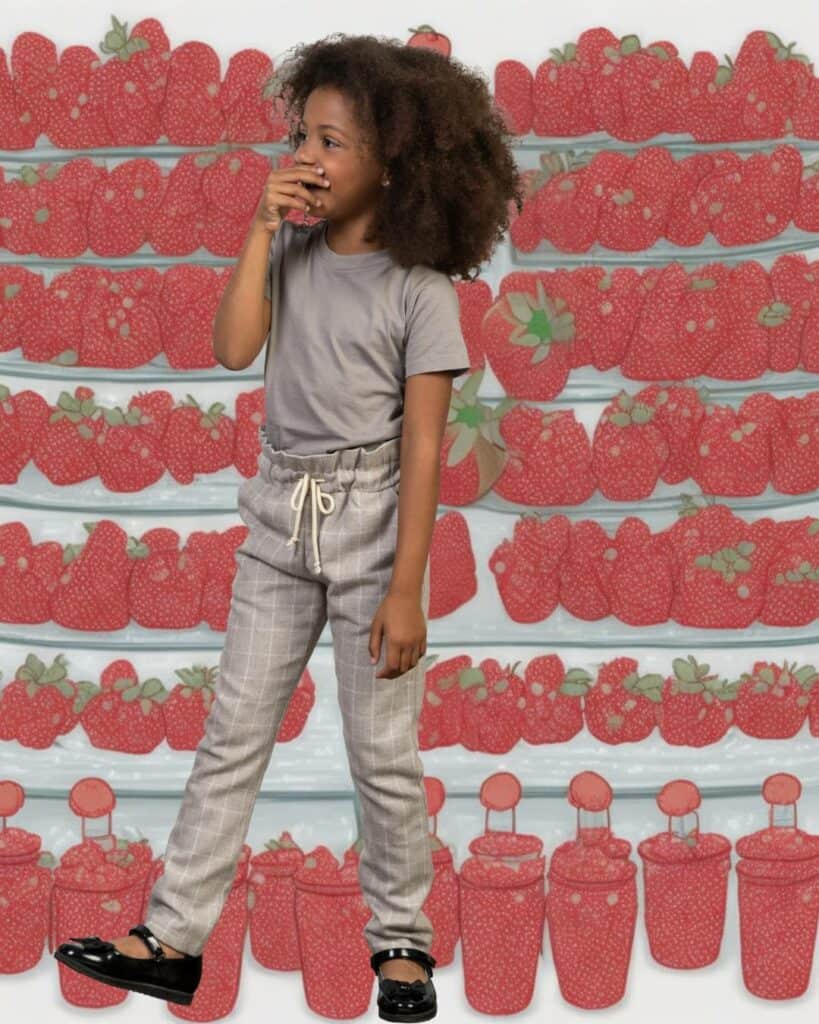When parents set out to start their baby on solids, they can find a lot of information online… but it can also come with a lot of misinformation. Online resources like social media can be an asset, but they can also breed falsehoods, fear mongering, and polarisation. This can add lots of unnecessary anxiety and stress to parents who are already stressed out.
Have you watched online as the comments on a (baby led weaning) post devolve into a flame war of us vs. them? Everybody’s angry and stressed out, but at least one side has to be the right side… right?
We call this black-and-white thinking. Social media will often polarise topics like these into simplified right or wrong categories… but at Happy Healthy Eaters we want you to get comfortable with the greys. It doesn’t have to be black or white, all or nothing, this side vs. that side.
So with that in mind, let’s get into today’s grey topic: is organic or conventional food better for my baby?
Table of Contents
What is Organic Food Exactly?
Organic food is produced by farmers who use certified organic farming practices, which are defined in the Canadian Organic Standards. The principle of these standards is to avoid the use of synthetic products (derived from lab-developed chemicals). As well, organic food is not produced with genetically-modified seeds.
Sounds kind of complicated right? It might get even more fuzzy when you learn that organic farmers can still use pesticides. Yes, you heard that right. Just like conventional farmers, organic farmers do use pesticides and fertilizers… the difference is that they must use products derived from natural sources and approved specifically for organic food production. Only about 3% of food grown in Canada is certified organic.
It is important to note that BOTH organic and synthetic pesticides go through the same government approval process to ensure they are safe.

What is Conventional Food?
The vast majority of food in our country is grown conventionally. Like organic producers, conventional farmers use a variety of tools (e.g. crop rotation, beneficial insects, cover crops) to produce food as sustainably as possible. One key difference is that conventional farmers have the choice to use technologies like biotechnology (i.e. genetic modification) and synthetic pesticides and/or fertilizers.
SIDE NOTE… Currently, only six genetically modified foods are grown in Canada: canola, corn, potatoes, soybeans, sugarbeets, and alfalfa. Only five more of them are grown globally: apples, cotton, eggplant, papaya, and squash. So the bag of pretzels that says “non-GMO verified project” is misleading. ALL wheat is non-GMO!
Is Organic Food Healthier or More Nutritious?
This is one of the most common questions we get from new parents. Parents obviously want to offer their babies safe and nutritious foods. So, what’s the verdict?
You’ll be thrilled to learn that there is no significant difference in the nutritional value of organically and conventionally grown foods. A rather fun study was published in 2012, which analyzed the findings of almost 250 existing studies. The researchers didn’t find any strong evidence that organic foods are more nutritious. They also found that conventional foods did not carry more health risks than organic alternatives.
Some organic foods have more vitamins and minerals than their conventionally-grown counterparts. Other foods have less. So it’s important to keep the big picture in mind. The nutritional content of any food will depend on many factors like soil quality, growing conditions, time of harvesting, harvesting method, etc. In some cases the diet of the animal itself will influence the nutritional makeup of the food. For example, the nutrition found in an egg will depend on the hen’s nutrition.
The bottom line in Canada is that foods like vegetables, fruit, grains, legumes, eggs, meats, and dairy are all nutritious.
Personally, the more we learn from our friends in agriculture and food regulation, the more pride and gratitude we have for our Canadian food supply. We’ve had the opportunity to work and tour various dairy, cattle, bison, vegetable, and crop farms, orchards, and agricultural research facilities across North America. The Canadian Food Inspection Agency, Health Canada, and Canadian farmers themselves all go to great lengths to ensure our food supply is safe and nutritious!
Can Organic Food Have Pesticides?
The short answer? Yes.
Does that surprise you? We know that a lot of people believe that organic foods will help them avoid pesticide residue (more on why you shouldn’t even stress about this below).
But pests pose a problem to all farmers, so organic farmers also need to find means to deter insects and prevent diseases in their crops. They have strategies such as crop rotation and mulch, but they also use chemicals to protect their harvest. There are country-specific lists of substances that are permitted in organic agriculture. While the basic standards of organic farming ban the use of synthetic substances, there are some exceptions to the rule.

Which is Safer - Organic or Conventionally Grown Food?
Hey now. There’s no need to pit one against the other. The truth is that BOTH are very safe.
In Canada, crop protection products are tightly regulated by federal and provincial regulations like the Pest Control Products Act. This means that when they are applied correctly, they are safe to use, and do not pose a risk to humans (at all stages of the life cycle so that includes babies), animals, or the environment.
The Canadian Food Inspection Agency (CFIA) sets maximum residue limits (MRL), which is the amount of pesticide that can legally remain on a crop. This level is set well below (up to 1000x) the amount that could conceivably cause a health concern to humans.
More good news: 99.9% of the fruits and vegetables tested in Canada by the CFIA are below the MRLs – and 90% contain no detectible pesticide residue!
So yes, conventionally grown food is safe for our littlest of eaters, your baby.
We have personally met quite a few Canadian farmers, and we know that both organic and conventional farmers want to:
- Feed their families, communities, and the global population with safe, high quality food
- use agricultural practices that protect the environment and biodiversity
- optimise their yield (what they produce) …among many other common goals.
Why is Organic Food More Expensive?
Since organic farmers can’t grow as much food on the same amount of land, and organic certification often comes at a cost, it can impact the price of food.
Innovations such as genetically engineered seeds and synthetic pesticides help to increase the amount of food we can grow helping to lower the cost of production… and these products work! In fact, without pesticides, the harvests of some fruits and vegetables would be 50% less due to loss from pests and disease.
There are other factors as well. Organic food is more expensive because:
- There’s limited supply vs demand
- Organic farms are often relatively small (compared to conventional)
These additional costs get passed on to the buyers!
Why Are So Many Baby Food Brands Organic?
We can only speculate on this one, but our best guess is that food companies know that parents of babies:
- Are willing to spend more on what they perceive to be safer products
- Believe that organic food is safer
Put those together and voila: food companies choose organic ingredients to appeal to their consumer base.
It’s a classic ‘chicken and egg’ scenario… which came first?
The food companies know that some parents want organic, so that’s what they use in their ingredient list. As a result, parents notice that baby food tends to be organic, and come to believe that organic food is a priority for babies. As a result, the food companies make more organic baby food!

Should I Be Using The Dirty Dozen to Help Me Shop?
Each year the Environmental Working Group (an independent non-governmental organization) analyzes US pesticide residue data and generates a list called The Dirty Dozen… the 12 fruits and veggies with the highest pesticide residues. Some people use this list to avoid buying the foods with the most residues.
But perspective is important here. The actual pesticide residue levels on fruits and vegetables is extremely low. Here’s a fun calculator that shows you how many servings of fruits and vegetables would be needed to have any potential impact from pesticide residues.
For example, a child could eat more than 90 cups of strawberries in one day and still be safe!
Our kids certainly eat a lot of fruit but never that much!
In the end, it doesn’t matter that strawberries have higher residue levels than corn, because the safety margins are so very wide. But wouldn’t it be a shame to miss out on the health benefits and amazing taste of strawberries?

The Bottom Line
Have we made things a little less black and white for you? There’s room in the world (from a philosophical and sustainable point of view) for both conventional and organic farming. They both produce safe, nutritious food, and they both aim to be sustainable. They’re different, but one doesn’t need to be better than the other.
But if you’re craving an all-or-nothing quote, how about this one: ALL food, whether organic or not, is extremely safe here in Canada.
We hope that you can walk away from this and make decisions about feeding your baby based on facts, not fear.
On that note, we’d like to leave you with a few nuggets of advice!
- Continue to buy food that fits into your budget. Research shows that when people are scared away from conventionally grown produce but can’t afford organic, they stop eating fruits and veggies! The benefits of eating fruits and vegetables far outweighs any theoretically minimal risk that pesticide residues may have.
- Stay calm – 99.9% of produce in Canada tests below maximum residue limits for pesticides. The potential level of exposure for you and your family does not present a health risk!
- Wash your produce under running water while scrubbing (if the produce can handle it). This is better than dunking or using specialized products. This will reduce any potential pesticide residues even further and will reduce the risk of food poisoning from any potential contamination.
This is a topic that we’ve been meaning to talk about for several years, and we’re so happy that we’ve had this opportunity!
Is there something new that you learned? Do you think you can feed from a place of confidence instead of fear? We hope so.







4 thoughts on “Should I Buy Organic Food For My Baby?”
What about food grown in the US, conventional vs organic? Aren’t Canadian restrictions tighter?
The requirements for conventional and organic in Canada and the US would be essentially identical. We have very similar general food regulations that apply to all food, and specific to organic production we have an equivalency agreement between countries so that if it is certified as organic in one it counts in the other.
Are the same
types of regulations in the USA?
Hi Nicole! Yes, the same types of regulations exist in the USA as well.